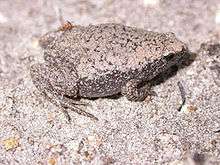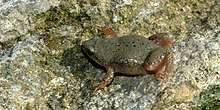Gastrophryne
Gastrophryne, the narrowmouth toads (also American narrowmouth toads, North American narrow-mouthed toads), is a genus of microhylid frogs found in the Americas between Honduras and southern United States.[1] Its name means ‘belly-toad’, referring to its large belly, from the Ancient Greek gastēr (γαστήρ, ‘belly, stomach’) and phrunē (φρύνη, ‘toad’).[2]
| Gastrophryne | |
|---|---|
 | |
| Gastrophryne carolinensis | |
| Scientific classification | |
| Kingdom: | Animalia |
| Phylum: | Chordata |
| Class: | Amphibia |
| Order: | Anura |
| Family: | Microhylidae |
| Subfamily: | Gastrophryninae |
| Genus: | Gastrophryne Fitzinger, 1843 |
| Species | |
|
4, see text. | |
Gastrophryne is closely related to Hypopachus. Some species that were earlier placed in Gastrophryne were more closely related to Hypopachus, rendering the genus paraphyletic.[1] This has been rectified by moving some species (Gastrophryne usta and Gastrophryne pictiventris) to Hypopachus.[3]
Gastrophryne frogs were the first species to be recognized to be experiencing speciation by reinforcement[4] and lead to the coining of the term reinforcement by W. Frank Blair in 1955;[5] a concept proposed by Theodosius Dobzhansky decades earlier.[6]
Species
The currently recognized species are:[1]
- Gastrophryne carolinensis (Holbrook, 1835) - eastern narrow-mouthed toad
- Gastrophryne elegans (Boulenger, 1882) - elegant narrow-mouthed toad
- Gastrophryne mazatlanensis (Taylor, 1943)
- Gastrophryne olivacea (Hallowell, 1856) - Great Plains narrow-mouthed toad

References
- Frost, Darrel R. (2014). "Gastrophryne Fitzinger, 1843". Amphibian Species of the World: an Online Reference. Version 6.0. American Museum of Natural History. Retrieved 22 March 2014.
- Dodd, C. Kenneth (2013). Frogs of the United States and Canada. 1. The Johns Hopkins University Press. p. 20. ISBN 978-1-4214-0633-6.
- Frost, Darrel R. (2014). "Hypopachus Keferstein, 1867". Amphibian Species of the World: an Online Reference. Version 6.0. American Museum of Natural History. Retrieved 22 March 2014.
- Blair, W. F. (1955), "Mating call and stage of speciation in the Microhyla olivacea-M. carolinensis complex", Evolution, 9: 469–480, doi:10.2307/2405481
- Sætre, Glenn-Peter. (2012). Reinforcement. eLS.
- Jerry A. Coyne and H. Allen Orr (2004), Speciation, Sinauer Associates, pp. 353–381, ISBN 0-87893-091-4